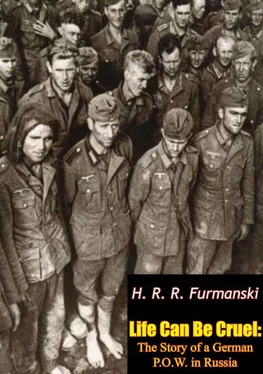H. Furmanski - Life Can Be Cruel - The Story of a German P.O.W. in Russia
Здесь есть возможность читать онлайн «H. Furmanski - Life Can Be Cruel - The Story of a German P.O.W. in Russia» весь текст электронной книги совершенно бесплатно (целиком полную версию без сокращений). В некоторых случаях можно слушать аудио, скачать через торрент в формате fb2 и присутствует краткое содержание. Год выпуска: 2016, Издательство: Pickle Partners Publishing, Жанр: Биографии и Мемуары, military_history, на английском языке. Описание произведения, (предисловие) а так же отзывы посетителей доступны на портале библиотеки ЛибКат.
- Название:Life Can Be Cruel: The Story of a German P.O.W. in Russia
- Автор:
- Издательство:Pickle Partners Publishing
- Жанр:
- Год:2016
- ISBN:нет данных
- Рейтинг книги:5 / 5. Голосов: 1
-
Избранное:Добавить в избранное
- Отзывы:
-
Ваша оценка:
- 100
- 1
- 2
- 3
- 4
- 5
Life Can Be Cruel: The Story of a German P.O.W. in Russia: краткое содержание, описание и аннотация
Предлагаем к чтению аннотацию, описание, краткое содержание или предисловие (зависит от того, что написал сам автор книги «Life Can Be Cruel: The Story of a German P.O.W. in Russia»). Если вы не нашли необходимую информацию о книге — напишите в комментариях, мы постараемся отыскать её.
An astonishing first-hand account.
Life Can Be Cruel: The Story of a German P.O.W. in Russia — читать онлайн бесплатно полную книгу (весь текст) целиком
Ниже представлен текст книги, разбитый по страницам. Система сохранения места последней прочитанной страницы, позволяет с удобством читать онлайн бесплатно книгу «Life Can Be Cruel: The Story of a German P.O.W. in Russia», без необходимости каждый раз заново искать на чём Вы остановились. Поставьте закладку, и сможете в любой момент перейти на страницу, на которой закончили чтение.
Интервал:
Закладка:
The dead bodies were taken out of the beds, undressed, and taken away. The same woman who had done the undressing brought out bread. We could not eat, putting the bread under our pillows against the time when we would be hungry, though many times the bread was taken away from us. In this way the disease spread from one room to another, and the entire house was soon an island of dying souls. When I entered this hospital the number of occupants had been close to three thousand, all the rooms being crowded to the fullest capacity. The mortality rate in the months from January to August was exactly 80 per cent. During my first fourteen days I was sick with typhus and had an average temperature of 102 degrees. I couldn’t eat a bite, but I badly wanted something to drink.
Every morning my nearest neighbor in the bed was dead. Often I envied these dead men, but when I saw how a dead body was treated—how they grasped it by the feet and dragged it out of the bed, the head striking the floor, my will to live was rekindled, and I hoped and prayed that I would get well and be permitted to leave this terrible house.
Most of the prisoners had typhus exanthematous, a deadly disease which requires special care, but here there was a shortage of doctors and drugs. I do not believe that anyone made a serious effort to save or cure a prisoner. The registration of the dead prisoners was simple, the nurse writing the name of the deceased on a strip of newspaper with a pencil and fastening this on the wrist with a cord or bandage. Nobody knows where these creatures are buried.
In the latter part of January my temperature dropped to normal, but my body was as emaciated as the others, my weight having dropped to ninety-six pounds. My strength had deserted me, and I was walking like all the others, keeping my hands on the wall for support. It took me almost four more weeks to be able to walk alone without any support.
Since I was a medical student, I was compelled to work in this hospital, and I was appalled at the manner in which the ill and wounded were treated. No care was exercised for the wounded, the bandages being taken off, laundered, and, after drying, put on again without being sterilized. All of the injured soldiers had worms in their wounds. It was shocking to witness their suffering. Besides those who were wounded, there were many hundreds with frostbitten hands and feet, most of them frozen in the third degree, which means that the frozen part of the hand or foot had already turned black. Though I barely had the strength to hold myself upright, I tried to help these men as best I could.
During the afternoon hours I went through all the rooms to see if I could help someone. I had no drugs or medical help, but I had the knowledge and ability to make a diagnosis and could suggest what should be done and give the order to the nurse. Starvation, shortage of drugs, and carelessness accounted for many deaths.
I was in this hospital almost eight months, sickened by the incredible disregard for the welfare of human beings. A commission was expected to arrive from Moscow to inspect the hospital, so a housecleaning was arranged, some women from out of town brought in to wash the windows. We had to scrub the floors ourselves. The nurses made some tablecloths from cotton, and for the first time they gave us sheets and pillowcases. The commission went through all the rooms except the isolation room. The convalescent prisoners were outside in the garden, taking a sunbath and waiting for the commission; our instructions were to tell them how grateful we were for being helped in our sickness. Nobody expected the commission to ask why so many prisoners had died, and none of the others had the courage to answer. I, being a member of the Red Cross, felt a certain compulsion to answer this question, and I told them everything I had seen in the eight months I had been there, concluding with the statement that, if I were ever granted my freedom, I would tell the Red Cross how the U.S.S.R. treated the members of the Red Cross and sick human beings. After the commission left I was declared healthy enough to go to work in a labor camp which was connected with a cement factory. My weight was still ninety-six pounds, and my strength seemed to have left me utterly.
I had never known that a human being could endure such misery, and I hoped and prayed to stay alive and to return to my parents and sister. Here in my lonely captivity deep in Russia, behind well-guarded fences, I realized for the first time how much I loved and missed my family. Often I thought of the bakeshop, wishing that I could eat all the leftovers and the flour which was spilled on the floor. Hunger makes animals of human beings, and the Russians took advantage of this knowledge by offering us two ounces more of bread each day, for which we would work doubly hard. The work in this cement factory was manual, since the factory itself had been established almost fifty years earlier, using old-fashioned methods and manned by political or criminal prisoners before we prisoners of war came.
At the railroad station, where the cement came in freight wagons, I had to unload the cement, shovel fifty pounds in paper bags, and carry it on my back into a storeroom. We were dusty from head to toe, the dust so thick in our ears and nose when the wind was blowing that we could scarcely breathe, but it was necessary to unload the wagon if we wanted to get our extra two ounces of bread that evening. Returning to the barracks at night, we seldom found water to clean our faces and hands, which contributed to our low spirits by forcing us to go about dusty and pale, looking like walking corpses. Counting the days and hoping for the end of the war was all that kept us going. It was now 1943, and none of us could or would believe that we would be here for several more years.
In this factory a Jewish woman doctor was in charge of the prisoners. This doctor knew that I was suffering from poor health and found time to talk to me as I came in the ambulance for treatment, questioning me about my descent, my education, and my family. I knew that I had found a friend, and she promised to help me, but she told me that she could do no more than was possible for her as a Russian citizen. I understood her position very well and didn’t ask for anything that could get her in trouble. She told me that she would grant permission for the most seriously ill prisoners to transfer to another camp. When we reported to the ambulance for physical examination, several days later, I praised the Lord when I found that I was among the twenty-five sick men to be transferred, and my gratitude to this doctor was unbounded. Still, there was no way of knowing whether the new camp would be better or worse. We had hoped before to leave the worse for a better, but each time our hopes had been dashed and we had found ourselves in a worse environment than that which we had left.
I was one of fifty eventually transferred to Susdal, a small town with a monastery several hundred years old. Its beautiful architecture was in evidence, but since the Revolution it had become dilapidated, uncared for by the present custodians, the buildings now housing the officers of the captured army. This camp was what was called a transit camp. The NKVD, or state police, checked the records of each prisoner from the day he had been captured. If contradictory statements were issued, or doubtful information given, those persons were questioned again and again. I found in this camp higher officers with some scientific background. One of them was the world-famed discoverer of Targesin, and was questioned many times a day before finally being transferred to an unknown location.
It was bitterly cold, with much snow on the ground, when we left Susdal, our destination unknown. The train was headed east. None of us knew what fate had in store for us, though we were still hoping to find a place where conditions would be a little better and where we could perhaps stay until the end of the war, at which time we hoped to be permitted to go home to our families. Home seemed more real to me than during the time I had actually been there. How I would love my family, keep my parents, and help them in their old age! I would do everything—if only I could find them alive. My thoughts were interrupted as the train stopped and we were forced to get off. It was night time, and as soon as we left the train we were counted by the guards, then told the bad news: our destination was Yelabuga, almost thirty miles distant, and we would have to march. It was near to forty degrees below zero, with five feet of snow; we were hungry and thirsty, and so tired that we had could have fallen down and slept. Many of us collapsed, getting up and moving again after a short rest on the ground, and some could not get up at all. We tried very hard to bring each one to his feet again, taking hold of his arm and carrying him so that we would not lose anybody. During the last few miles of our march we saw houses on the horizon, only to find that they were mirages of our exhausted minds. Three miles from Yelabuga I collapsed and felt myself powerless to rise. It was an odd feeling, strangely comfortable, and I wished very much to die. Death due to exposure to cold would appear to be easy to endure. The commandant of Camp Yelabuga knew we were coming and had sent a sleigh to bring the most helpless. I was put in the sleigh along with several others, and after an hour’s ride we arrived at Camp Yelabuga.
Читать дальшеИнтервал:
Закладка:
Похожие книги на «Life Can Be Cruel: The Story of a German P.O.W. in Russia»
Представляем Вашему вниманию похожие книги на «Life Can Be Cruel: The Story of a German P.O.W. in Russia» списком для выбора. Мы отобрали схожую по названию и смыслу литературу в надежде предоставить читателям больше вариантов отыскать новые, интересные, ещё непрочитанные произведения.
Обсуждение, отзывы о книге «Life Can Be Cruel: The Story of a German P.O.W. in Russia» и просто собственные мнения читателей. Оставьте ваши комментарии, напишите, что Вы думаете о произведении, его смысле или главных героях. Укажите что конкретно понравилось, а что нет, и почему Вы так считаете.












